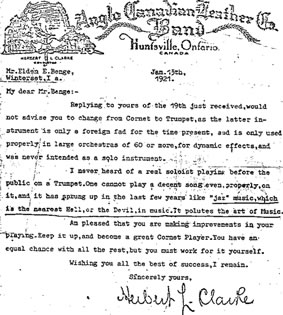Anticipating Change Click
the letter at right for a full sized image. Click
the letter at right for a full sized image.January 13, 1921: Herbert L Clarke was at the forefront of the brass world. He was the leader in his field, and his band, along with Sousa’s band, was one of the best of the time. Herbert L. Clarke was a giant. He showed us what could be done as a virtuoso cornet player, and he created resources that we are still using over 80 years later, to wit, the ever charming Herbert L. Clarke cornet solos and his famous and invaluable fingering exercises. But as it seems from this letter, even with all the attributes he so rightly deserves, he did not have a vision of what was to become of the musical world of that very special period. We shouldn’t be too hard on Mr. Clarke. It was another time, life was simple and naïve then; certainly Mr. Clarke was not anticipating change; his life was full and rich. Both he and his band were experiencing enormous success; things were secure, why change? The world has changed enormously since that time. The planet has become a global village, and the internet has opened doors to instant and fluent communication. It was easy 84 years ago not to know or see what was happening in the other musical venues of the world. There are still those, even now, in the first decade of the 21st century, who try not to see and know the new directions of the international musical world. Surviving with that point of view, however, is becoming difficult. Change comes so quickly now that not accepting it is really no longer an option. We must accept it or we will find ourselves behind the times before we realize what’s happened. Whether it’s the emergence of the trumpet in North America during the Herbert L. Clarke period or electronics into music of the 21st century, the one thing we can be sure of is that change is inevitable. How we accept change is a personal thing. It’s the nature of our species to make changes and to try and make improvements. Brass instruments seem to always be in the process of evolution, and brass players are chronically seeking the best and most sophisticated equipment available. Symphony orchestra brass sections, for example, are always exploring new instruments in hopes of better intonation, response, timbre, and ergonomics. Indeed instruments are improving and this is particularly true of the tuba. But is this evolution always a good thing? We have orchestras in the world today that are not only great symphony orchestras, but also serve as "sonic museums," ensembles that demonstrate the sound of a particular musical period. This is a wonderful thing but musicians who play in these "sonic museums," the Vienna Philharmonic for example, are beginning to show signs that they would prefer to start using the more sophisticated instruments rather the traditional ones they have been using over a hundred years. This situation requires a question; do we move with the time to new and better equipment or stay with the traditional equipment and the traditional sound in the setting of the "sonic museum?" Though decision; is it possible we could have it both ways? That’s exactly what Vienna is dealing with now, and frequently finding that the newer equipment simply sounds better. Things are moving so fast now that the only way to prepare for change is to anticipate it and hope our background and experience will guide us well in our educated guesses. Thanks to Herbert L. Clarke, who has left us such a rich legacy, it’s ours to keep as we move into the future. Amsterdam, Netherlands - September 15, 2004. |

